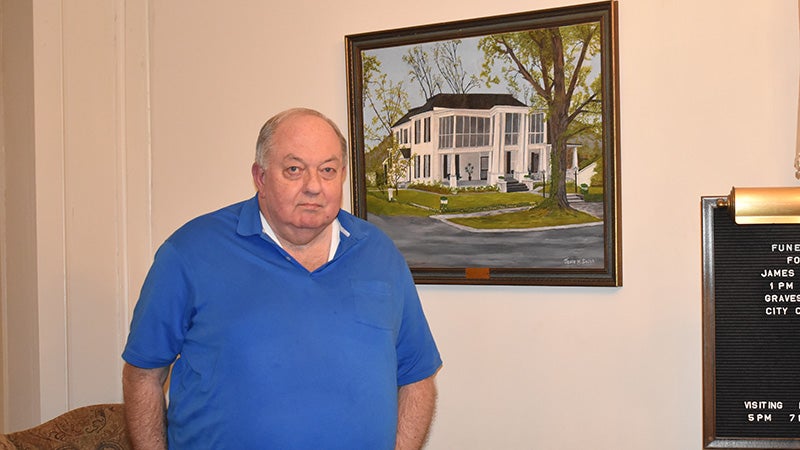PROGRESS 2024: Coroners seek to provide answers, comfort
Published 12:00 pm Saturday, March 2, 2024
|
Getting your Trinity Audio player ready...
|
It’s 3 a.m., and your phone starts blaring. You roll out of bed to take the call, grab your keys and run out the door. Blue and red emergency lights illuminate the night as you pull up to a scene, make your way to the house where paramedics and investigators are gathered.
The body you find is an older woman. On the counter in her kitchen is a medical alert bracelet and a few bottles of medications laid out. You ask the paramedic on the scene what happened, and they explain that the patient went into cardiac arrest after they arrived.
For the next couple of hours, you’ll get information about the scene and the patient, interview the family and any witnesses. As the sun is coming up over the trees behind the house, you’ll examine the body for anything out of the ordinary and then make a call.
It will either be a call to the family’s chosen funeral home or the morgue to await a transfer to the Georgia Bureau of Investigation or the Alabama Department of Forensic Science. But by then, you’ve begun to gather the pieces you need to make a ruling in the death investigation.
This is what most nights look like for a coroner or deputy coroner on call.
“Our job is to determine cause and manner of death. And we use clues, and we use medications and medical records,” said Erin Hackley, Troup County’s coroner.
Hackley doesn’t spend much time inside her office. She and her chief deputy, Amy Sheppard, and her deputy, Josh Speelman, use the space to complete their paperwork, store their supplies and meet with families. The rest of their job happens out in the community.
The office in Chambers County is a little smaller. Jeff Jones, the coroner, has one deputy coroner, Levi Richardson. Jones is currently serving his fourth term as the coroner after decades of serving the county as a funeral home director. They work out of Jeff Jones Funeral Home.
Who is the coroner?
Jones has known what he wanted to do for as far back as he can remember. He started his apprenticeship at Johnson Sanders Funeral Home in LaFayette when he was 16 years old. He worked under his mentor until 1997 when he passed away and Jones purchased the funeral home.
It only made sense in 2006 when the county’s former coroner retired that Jones run for the position.
“That’s just something I’ve always wanted to do,” Jones said.
Conversely, the job wasn’t one Hackley saw for herself. She actually began her career on the other side of the scene: as an EMT, and later, a paramedic. But in many ways, her 16 years in EMS was the best preparation for the job that she could have ever hoped for. It’s how she first met the county’s former coroner, Jeff Cook.
Hackley began working in Troup County in 2008. For many years, Hackley wanted to work with Cook. Before he retired, she became his chief deputy coroner, bringing a background knowledge of medicine and anatomy plus experience at crime scenes or emergency/trauma calls.
In 2016, Hackley ran for coroner of Troup County and won. That’s not where the trials ended though. In the first 15 hours of her term, there were four death calls, one of which was when a tree fell on a house.
“I was in high heels at three o’clock in the morning, three hours into my job, climbing up a tree,” Hackley said.
Hackley began her first term as coroner amid the height of the pandemic. COVID-19 shook things up for many healthcare fields around the world, not least of which was the coroner’s office.
In a rural town like West Point or LaFayette, there isn’t always a designated county morgue. In Chambers County, Jones usually sent the body to the funeral home of the family’s choice. Hackley, too, sent the bodies to the funeral home or the morgue at the WellStar West Georgia Medical Center.
But what do you do when there are more bodies than there are tables in the morgue?
In Hackley’s first year, there was a 41% increase in county deaths.
Sheppard theorized that the number of deaths rose in the county for many reasons, some of which may have been the effects of isolation during the lockdown. Hackley agreed that many people weren’t visiting the doctor like they normally would.
“All the funeral homes were full. The [hospital] morgue was full. I was on a death call where a commissioner was on the scene … I said we are one body away from me having a real disaster this weekend,” Hackley said.
Within a week of speaking with the commissioner, Hackley got the call that they had ordered a morgue. She said that the pandemic wasn’t the reason the county needed the morgue, but it certainly exacerbated an already present issue.
For Chambers County, Jones said the COVID-19 pandemic didn’t have the profound effect that it did on larger cities like New York. But it didn’t help matters.
More than anything, it changed the way that funerals had to operate. Jones’ funeral home only held graveside services during the pandemic, and everyone had to social distance.
What is a coroner?
There’s a difference between a coroner and a medical examiner. A medical examiner is the person who performs autopsies. But most counties don’t have enough of a need for their own medical examiner. Only five counties in Georgia have their own.
In most counties, the chances are that the person at the scene of a death call is the coroner. It’s their job to perform the death investigation.
They do this by determining the cause and the manner of death. There are five different manners of death: natural, accidental, suicide, homicide or undetermined. But there are hundreds, if not thousands, of causes of death.
Cause of death is just one clue they use to determine the manner of death. More complete information comes from the investigators on the scene, witnesses or family members and the medical history and medications of the deceased.
“It’s like putting the puzzle pieces together,” Sheppard said.
In many cases, a scene can be fairly clear. An 80-year-old woman with a terminal illness who passes away while in hospice care would not pose too much trouble. The manner of death is likely “natural” and the cause of death may be cardiac arrest, pneumonia or organ failure.
But what does it mean when a young person or child passes away unexpectedly? How does a traumatic wound inflicted by another person change the process?
Let’s say a 27-year-old person in good health passes away after an armed robbery. The manner of death may be “homicide” and the cause of death would likely be a gunshot wound.
At this point in the investigation, a common misconception may come up, Hackley said. Most people think that if a coroner rules a death “homicide,” then surely what follows are murder charges. But it’s not the coroner’s job to rule on whether there was foul play.
Hackley’s job is to determine whether a death was caused by natural causes, an accident or by the actions of another person. That’s where her role in the investigation ends and the law enforcement begins.
Since Hackley, Sheppard and Speelman all have a background in EMS or law enforcement in Troup County, they have a good working relationship with the local investigators. Hackley said they try to investigate the crime at the same time as the officers.
“They investigate what happened for this body to be here,” Hackley said. “We investigate why the body’s here.”
“They have answers to some of the questions, we have answers to some of the questions and then when you put it all together, you get a much clearer picture of what might have happened,” Sheppard added.
Besides that, there are actually many circumstances in which a “homicide” doesn’t necessarily equal “murder” or even “manslaughter.” The shooting victim may be one of them if they were injured in a “suicide by cop” scenario.
Another common misconception caused by TV shows like CSI — what Hackley calls the “CSI effect” — is that they can somehow pinpoint the exact time of death based on the scene alone. There are so many environmental factors that can impact the scene and the body that a rough estimate is the most you can usually hope for, Sheppard said.
Another thing many people don’t realize is that the coroner can’t speed up the process on an investigation, Sheppard said. Especially if the body made its way to the medical examiner’s office, the death certificate and the report on the manner and cause of death simply can’t be rushed.
The medical examiner’s office, which serves 154 of the 159 counties in Georgia, can take up to three to four months to get the report back, factoring in the wait time on things like toxicology labs.
It is one of the most common complaints Jones gets as well. Still, he and his Troup County counterparts know better than most what a hard time it is for families.
“Because nobody wants to see the funeral director, and then no one wants to see the coroner,” Jones said. “But it makes you feel good … When you go sit with the family and you talk to them, and they tell you ‘thank you for being there,’ it makes it worthwhile.”
Going back to the scene of that elderly woman, the coroner is speaking to the loved ones on what has become the worst day of their life. But surprisingly, that’s just what makes it worth it to Hackley and Jones.
Jones said he always stays with the family until the body is picked up. He may or may not know them but after that day he will certainly come to know them.
Many of the families in his death calls stay in touch throughout the process, particularly if their loved one is transported to Montgomery to the Alabama Forensic Sciences Department for an autopsy.
Jones remembered one such case that stuck with him. He met a mother under unfortunate circumstances. Her baby had passed away and needed to be transported to Montgomery for an autopsy. Jones sat with the mother and talked her through the process and why he had to take her baby away.
“She would call me periodically and ask questions,” Jones said. “And we became really good friends.”
Hackley and Jones both said they have both dreaded the days when they get a call about a friend or family member of a friend.
But Hackley always takes those calls. When she knows it will comfort the family to see a familiar face, someone that they trust to show the utmost respect for their loved one, how can she do otherwise? More than that, though, Hackley knows what those families are going through.
“There are calls that bother me. But it’s the families, not the deceased,” Hackley explained, having lost her own daughter six weeks into training as an EMT. “Because I know where the family is.”
Though there are certainly tough days being around so much grief, Hackley said she was meant for this job.
Jones also reflected on all the memories he had over the years, from watching a graveside service end with a few cold beers to witnessing a snowfight break out next to the grave.
“You never know what little things you do that impress people, but I have made some really good friends that I didn’t know both in the capacity as funeral director and as coroner,” Jones said.






